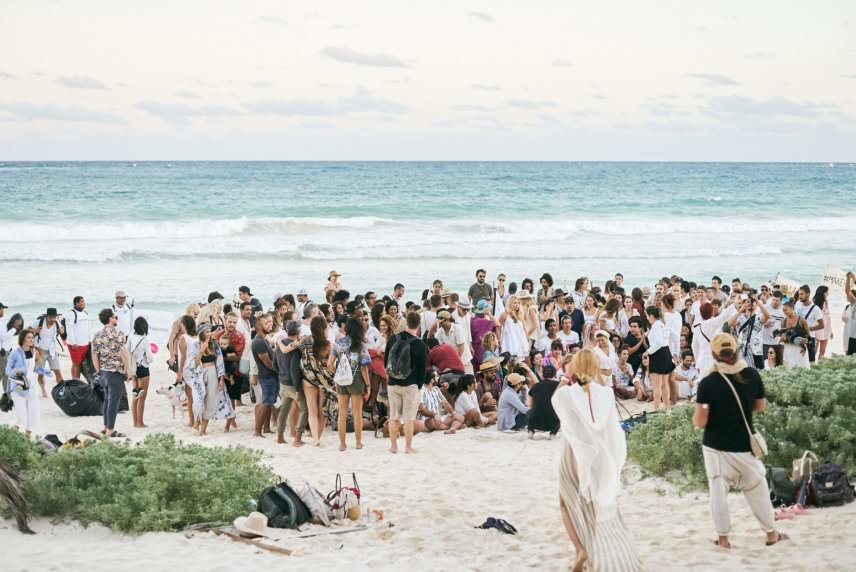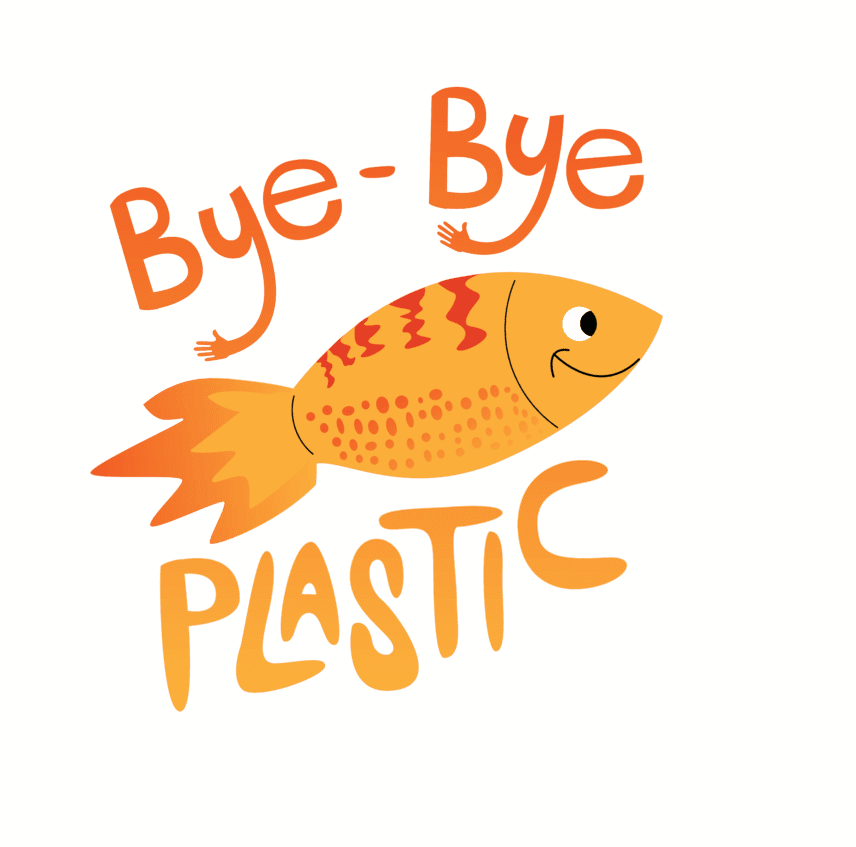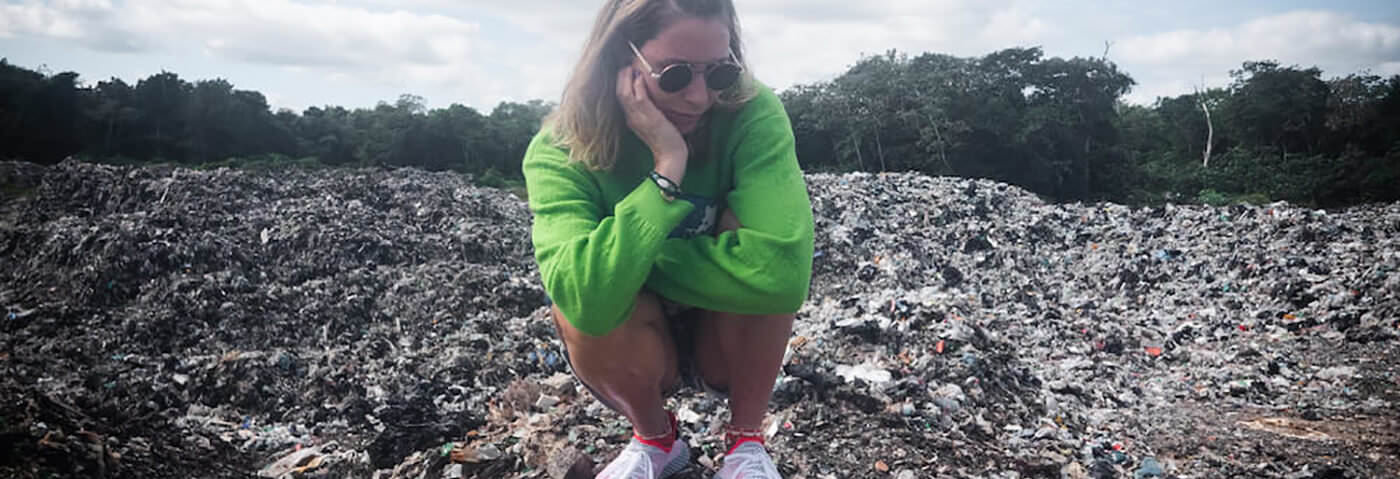We spoke to Blond:Ish on accidental activism and hope in the age of hypocrisy.
“Why don’t you take that job on? It’s a small task, just do it?” Vivie-ann Bakos has just turned the tables of our conversation, positioning interviewer as interviewee. And rightly so.
We’d mentioned the double standards of Westerners, beneficiaries of a 200 year industrialisation process dependent on fossil fuels, demanding cleaner growth from developing nations, with the only help usually on offer further extending a legacy of economic subservience. Her answer, in the form of a question, says more than we ever could about the challenges involved in tackling the climate crisis.

The artist better known as Blond:Ish is no stranger to environmental issues. Just before Christmas the Canadian-born, LA and Barcelona-based producer and DJ made headlines for the latest step in the female-led Bye Bye Plastic movement she is central to, asking artists, promoters and venues to remove single use plastics from riders. Over 1,500 touring professionals had signed up by mid-December. It is hoped this will catalyse the overall scene to follow suit, and it has been a long time coming.
“I mean you need a degree in this stuff to make the right decisions, and some of the solutions don’t actually exist yet,” Bakos replies when we ask why she thinks causes like this have taken so long to materialise in music, when evidence has been difficult, if not impossible to contest, for decades. “It’s really hard to navigate. It’s not something you can just do a Google search for and find a solution.
“The way our society has been structured, they made it confusing,” she continues, while we consider our own experiences of the phantom ‘they’. “They say biodegradable, but what does that mean? It could be plastics. It just means it breaks down at some point. They confused us. They — I don’t know who they are but they are very famous, this group of people — they have confused us.”
She has a fair point. Most of us are sure something needs to be done to save the planet, and the time for action is now, but the debate as to exactly what form actions should take, and which issues to address first, lies at the centre of our inaction. At both governmental and corporate levels economics and policies remain set to business as usual when wholesale change is the only logical route.
In the UK, recyclables have been shipped to dumps in far flung places like Indonesia, shifting the problem rather than addressing it. Germany’s €54billion eco-spending package sounds great, yet the country is currently Europe’s largest coal consumer.

These examples are relatively easy to solve — to reduce the impact of coal commit to use and produce no coal. Fulfilling recycling promises means actually recycling. By comparison, how do we improve the environmental credentials of a music industry that has never been so dependent on travel to function, and is intrinsically linked to consumption? “We live in hypocritical times. Everything is kind of being re-written and changing. Not just with environmentalism and the Earth Movement. Everything,” Bakos replies.
“You know, we are a bunch of hypocrites trying to be sustainable but we are putting in endless hours to try and find solutions. One thing I love to say, which I saw last year, is ‘even the word impossible has the word possible in it’. You know, anything is possible,” she continues with refreshing directness, revealing an inherent optimism much-welcome in today’s era of doom and gloom.
“I saw something yesterday I wanted to tell you about because it reminded me of you and this interview,” says Bakos, barely leaving time for us to guess at the big reveal. “It’s a quote; ‘The best way to predict the future is to create it’. So we are, with Bye Bye Plastic, with all our efforts, gathering all the DJs and eco-warriors in the community and making a different future. That’s what we are doing.”
I was in denial that I was an activist. Then I was on German television, on DW, to talk about Bye Bye Plastic and they called me an activist. I almost fell off my chair.
If that seems a little vague let’s break it down tangibly. As if to accentuate the labyrinthine quandary facing Bakos and her peers, when we speak she is in the midst of three dates in Dubai, and recovering from jet-lag after flying from the U.S. Nevertheless, she’s also just finished a two hour call with the Bye Bye Plastic team, in which a number of things were discussed, including recent registration as a foundation which will collaborate with clubs and festivals, working towards the goal of neutral impact.
They also talked about working with DJs For Climate Action, a collective led by New York’s Sammy Bananas which engages in carbon off-setting, low-emission tours and events, and also organises Earth Night. The latter is an extension of Earth Day — 22nd April this year — and takes the form of parties across the world with the aim of emphasising the power of collectivism. It’s more obvious that we are not alone when we can see our compatriots, and feel their determination.

“Imagine the power. It’s not just about the thousands of people that come to the parties in the cities, it’s about the millions that watch. We are always looking for acceleration techniques and strategies,” she says of a current push to bring in more streaming partners, exponentially increasing the reach of Earth Night’s message, and that of Bye Bye Plastic.
Raising awareness by emphasising solidarity is key to tackling any issue, especially one overwhelming enough to confuse and confound the corridors of power. But Bakos believes the most significant steps individuals can take are more achievable than it seems — it’s about the ripple effect. “What I learnt is to change what you can that’s closest to you, with your friends, and with that you are inspiring other people that love music around the world, who will start inspiring change within their communities.
“Eventually we just start overlapping. We need 20% of the population to reach a critical mass, so we don’t need everyone. So that’s how I’m looking at this thing, I’m really just trying to influence myself, my friends, the music community. Everyone that I’m really close to, and that’s how I feel we are going to reach the critical mass,” she continues. “That’s what I can do. And in doing that, all of us, we will get somewhere eventually.”
Bakos’ logic is sound, and her perspective on-point, but she’s also honest enough to admit that for all her understanding of the music industry’s workings and potential to encourage action, her knowledge of corporate structures — the corporate structures that must get on board to stop us all from sinking — is more limited. Perhaps that’s not too surprising, though, given her role as campaigner was never intentional. “I was in denial that I was an activist. Then I was on German television, on DW, to talk about Bye Bye Plastic and they called me an activist. I almost fell off my chair.”
It’s not just about the thousands of people that come to the parties in the cities, it’s about the millions that watch.
This position — accidental activist — raises another contentious issue. Civilisation can no longer afford to abstain from environmental activism, yet the term ‘activist’ continues to conjure militant rather than progressive mindsets. It’s connotations are often negative as oppose to positive. Bakos thinks the way to overcome this is to focus on inclusivity.
“Activism might be seen as a bit extreme right now, because it means you can’t be friends with everyone, you will lose some friends because you have to take a stand,” she says of the delicate predicament. “But I feel that will change, like really soon. As you can see from the Australia fires, we are getting desperate. We are in Code Red. It’s going to be a role that everyone will take on wherever they are living. Without getting too serious — let’s do it and let’s make it fun.”
In many ways electronic music is uniquely positioned to take a lead in this. Debates have waged since rave immemorial about politics in dance culture. Nevertheless, the community has always been linked — deliberately or otherwise — to messages of hope and unity. A culture with a history of overcoming struggles through shared experiences is an ideal platform for ideas to combat the greatest struggle in history.
So the question is not ‘what must be done?’ — people should do something, anything, to help everyone overcome these dismal odds. Instead we need to ask ‘how do I best get involved?’ Bakos, and movements such as Bye Bye Plastic and DJs For Climate Action, are offering answers. These may not be comprehensive because the problem is so complex, but it would be foolish to see them as anything other than essential.
Martin Guttridge-Hewitt is a freelance journalist based in the UK. Follow him on Twitter.
For more information on Bye Bye Plastic follow their Facebook page.

07.55 AM
Wait til you find out how toxic vinyl is, or how much pollution flying between cities creates.